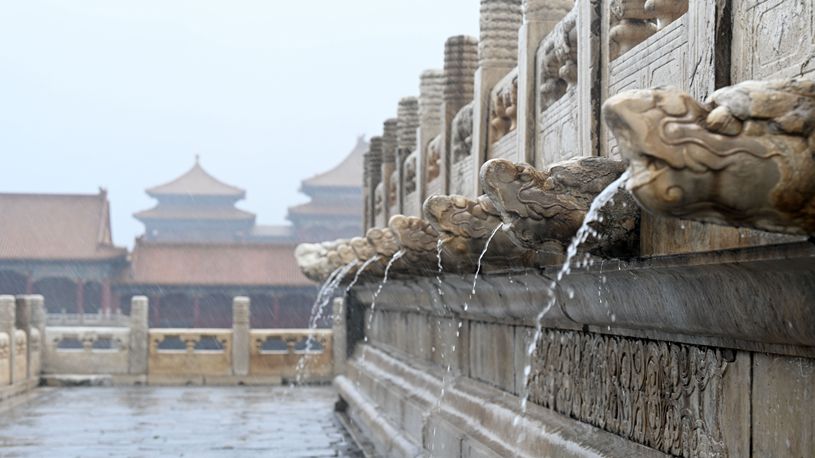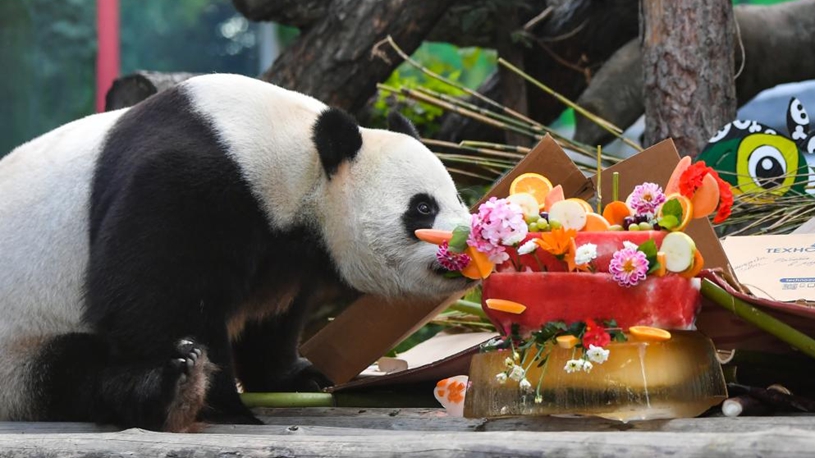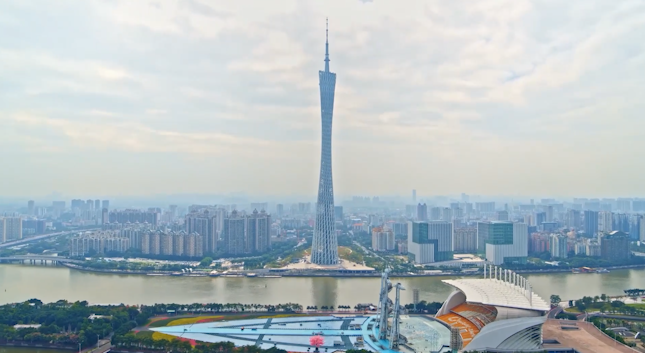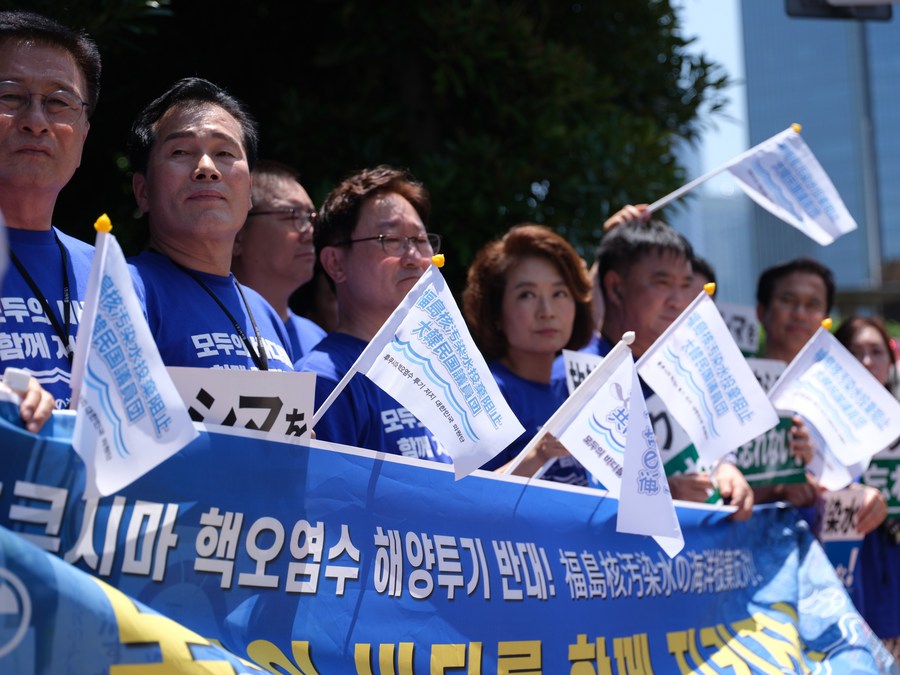
People attend a rally against Japan's radioactive wastewater dumping plan in front of the Japanese prime minister's official residence in Tokyo, Japan, July 10, 2023. (Xinhua/Zhang Xiaoyu)
Studies have shown that the tainted water from the Fukushima nuclear power plant contains more than 60 radionuclides, including tritium, a long-lived and toxic element inseparable from water. If released into the Pacific Ocean, the radioactive material will find its way into the food chain, thus bringing detrimental damage to both marine environments and human health.
by Xin Ping
Lying on the Pacific coast near the northern tip of Fukushima Prefecture, a small town named Shinchi is blessed with a wide variety of seafood, which local dwellers have relied on for generations as a primary source of food and living.
But don't expect Fukushima fish on dining tables in the region. At the same time, Fukushima residents fear losing their livelihood due to the Japanese government's irresponsible decision to discharge nuclear-contaminated water into the ocean.
Twelve years ago, a massive 9.0-magnitude earthquake hit northwest Japan. The ensuing tsunami killed 16,000 people and crippled the Fukushima Daiichi nuclear power plant, causing severe overheating of operating reactors.
Since the nuclear meltdown, water pumped into the facility to cool down the debris now measures 1.32 million metric tons, enough to fill more than 500 Olympic-sized swimming pools. Despite opposition at home and abroad, Japan has insisted on dumping the nuclear wastewater into the ocean over a 30-year period, sparking global anger and anxiety over the long-term impact of ocean discharge on people's health and the marine environment.
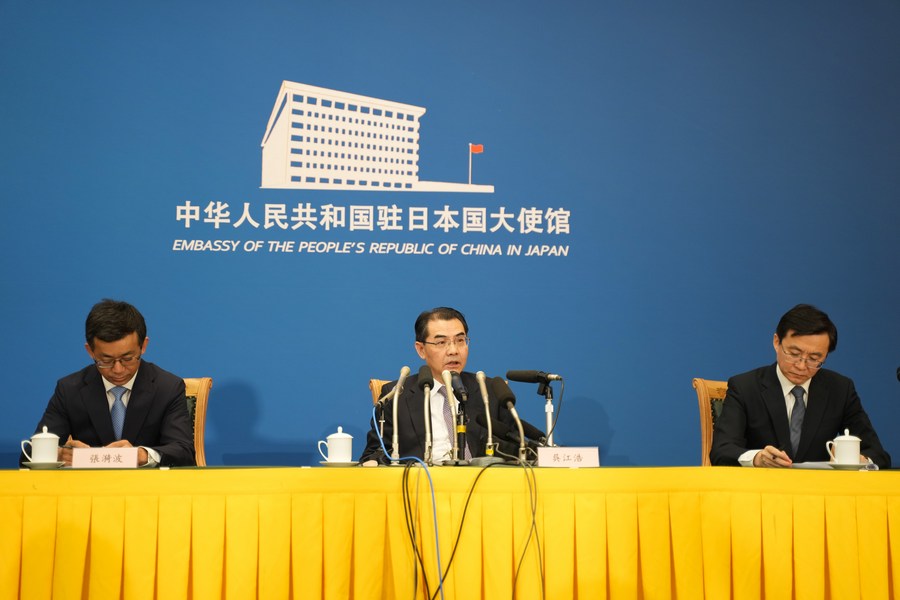
Chinese Ambassador to Japan Wu Jianghao (C) speaks at a press conference in Tokyo, Japan, July 4, 2023. (Xinhua/Zhang Xiaoyu)
SKEPTICAL PUBLIC
Japan's plan of dumping the radioactive Fukushima water has stirred concern among the public, especially the Pacific-rim countries.
"How could I feel safe?" said a coastal citizen of the Republic of Korea, which will bear the brunt of future radiation exposure after nuclear water is poured into the Pacific Ocean. Pacific island countries, whose economies are highly dependent on tourism, fear that they may lose global beach-goers once the ocean is polluted by the wastewater carrying toxic radionuclides.
Even the Japanese find it difficult to trust their government, which has insisted that the ocean discharge plan is "safe."
The latest Kyodo News poll shows that the approval rating for Prime Minister Fumio Kishida's cabinet neared the lowest level in his tenure as the government grapples with concerns over the release of Fukushima nuclear water. About 80 percent of respondents said they felt the explanation provided by the government on the issue was insufficient, and 87.4 percent said the water release would more or less bring damage.
To persuade the public to support its ocean discharge plan, the Japanese government developed a mascot called "Little Mr. Tritium" to feature in animated videos and leaflets. The small greenish creature was soon scrapped after widespread criticism that the government was toning down the impact.
BIASED CONCLUSION
The long-expected assessment report from the IAEA, a UN nuclear watchdog, was narrowly focused. It drew a hasty conclusion on the "negligible radiological impact" of the wastewater from the wrecked nuclear power plant.
The IAEA report remains controversial as it failed to review the justification and legitimacy of Japan's ocean discharge plan. It did not assess the long-term effectiveness of the country's purification facility and could not prove the accuracy of its nuclear-contaminated water data.
It is noteworthy that sea discharge is neither the only option to dispose of the nuclear-contaminated water nor the safest and most optimized plan. Instead, it is the option with the lowest economic cost for Japan and the highest radioactive contamination for the global environment.
Studies have shown that the tainted water from the Fukushima nuclear power plant contains more than 60 radionuclides, including tritium, a long-lived and toxic element inseparable from water. If released into the Pacific Ocean, the radioactive material will find its way into the food chain, thus bringing detrimental damage to both marine environments and human health.
Despite the mounting doubts over the long-term uncertainty and risks of its ocean dumping plans, the Japanese government is shirking its responsibility to prioritize cost-effectiveness. The decision poses a threat to people worldwide.
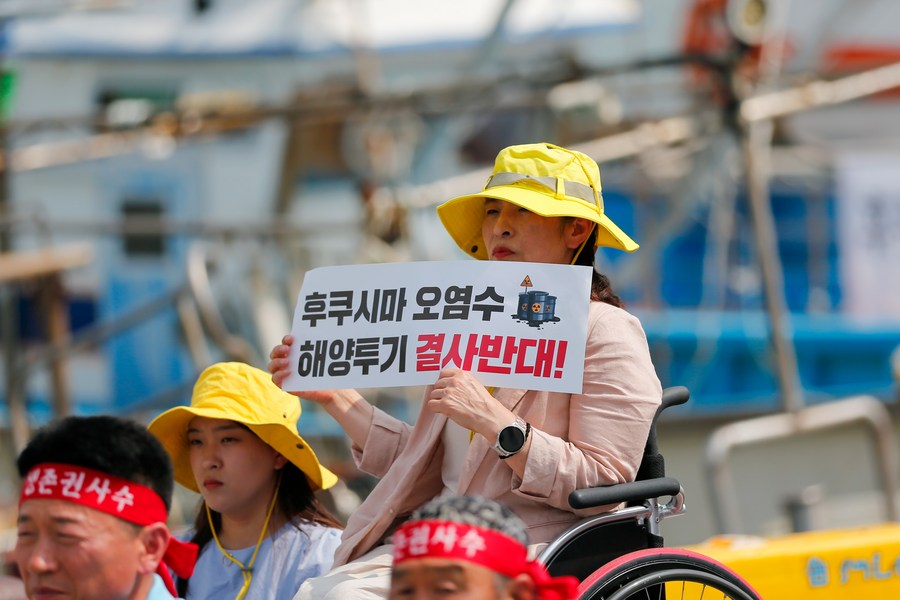
People attend a rally to protest against Japan's planned release of nuclear-contaminated wastewater into the ocean, in Boseong County, South Korea, on July 26, 2023. (Xinhua/Wang Yiliang)
CREDIBILITY DEFICIT
The actions taken by the Japanese government, which prioritizes its own interests over the well-being and health of humanity, have significantly harmed its credibility.
It was reported that Japan made political donations of over 1 million euros (about 752,000 U.S. dollars) to the IAEA for the latter's endorsement of the ocean discharge plan. Given the undue influence exerted by the Japanese government, the world has every reason to question whether the IAEA report reflects objectiveness and views from all sides.
Tokyo Electric Power Company (TEPCO), which operates the Fukushima Daiichi nuclear power plant, was also heavily criticized over its spotty record of fiddling with data and lying to the public. It has little, if any, public credibility. Fukushima could have survived, and contamination could have been prevented, had TEPCO put in place mandatory safety measures, admitted the company.
After the tsunami struck the Fukushima nuclear power plant, it took the Japanese authorities more than four years to admit that radiation from the accident had contributed to a local construction worker's leukemia. Just as it ignored the suffering of residents, Japan has once again turned a blind eye to the poisonous impact of its ocean discharge plan.
The nuclear-tainted water should not be released without the consent of the Japanese people and the rest of the world. Proper disposal of nuclear water is crucial and should be done scientifically, transparently and safely.
If Japan ignores scientific evidence and facts, it could lead to the accumulation of a dangerous toxin in our food and environment. This would cause irreparable harm to both people and our planet.
Editor's note: Xin Ping is a commentator on international affairs, writing regularly for Xinhua News Agency, Global Times, China Daily, CGTN, etc. He can be reached at xinping604@gmail.com.
The views expressed in this article are those of the author and do not necessarily reflect the positions of Xinhua News Agency.■



